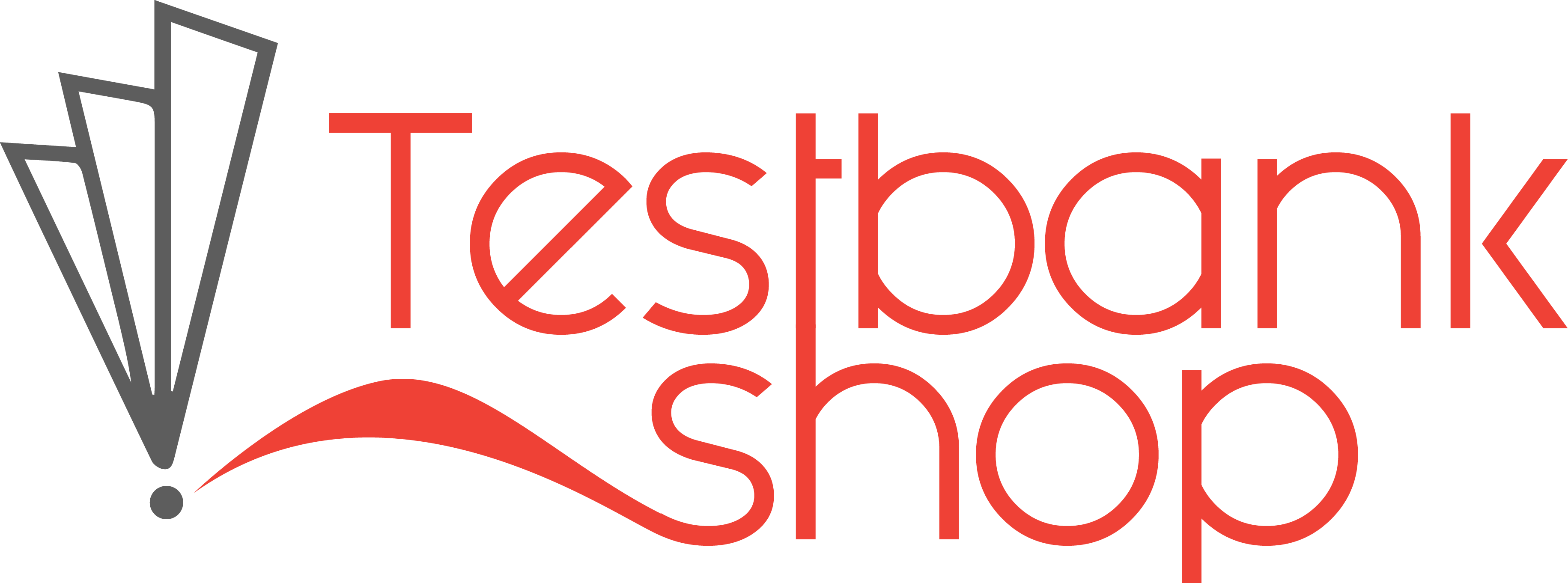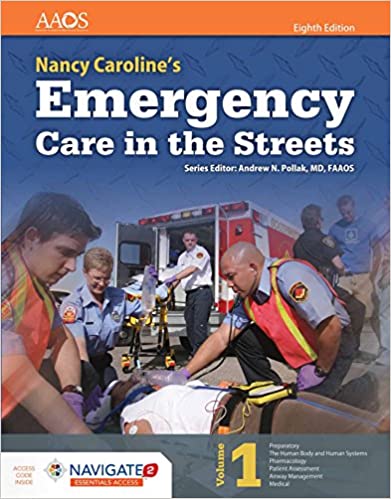Test Bank for Emergency Care in the Streets 8th edition By Nancy Caroline’s
CHAPTER 1
1. EMS stands for:
a. Evolve Medical Service
b. Emergency Medical Services
c. Emergency Medical School
d. European Medical Services
ANS: B DIF: Easy REF: Pg. 4
2. The first recorded use of an ambulance was by the military during the Siege of Malaga in:
a. At the beginning of 1400
b. In the mid of 1400
c. At the start of 1500
d. At the end of 1400
ANS: D DIF: Moderate REF: pg. 4
3. (CoAEMSP) is the only accrediting body for paramedic programs which stands for:
a. Committee on Accreditation of Educational Programs for the EMS Professions
b. Committee on Association of Educational Programs for the EMS Professions
c. Conference on Accreditation of Educational Programs for the EMS Professions
d. Committee on Accreditation of Educational Programs for the EMS People
ANS: A DIF: Hard REF: Pg. 10
4. A registry system which is used to test and establish licensure is:
a. NREMT
b. NREMS
c. NREMP
d. NREMR
ANS: A DIF: Moderate REF: Pg. 9
5. What is Reciprocity?
a. Granting certification to a provider from same state or agency
b. Granting certification to a provider from another state or agency
c. Granting certification to a provider both from same or another state
d. No need of granting certification from any state
ANS: B DIF: Easy REF: Pg. 10
6. Select the correct ranking:
a. The Dispatcher, EMT, Paramedic, Advanced EMT, Emergency Medical Responder
b. Emergency Medical Responder, Paramedic, EMT, Advanced EMT, The Dispatcher
c. Paramedic, Advanced EMT, EMT, Emergency Medical Responder, The Dispatcher
d. The Dispatcher, Emergency Medical Responder, EMT, Advanced EMT, Paramedic
ANS: D DIF: Moderate REF: Pg. 12, 13
7. Who launched the first rescue squad called Roanoke Life Saving in 1928?
a. Nancy Lee Caroline
b. Baron Dominique-Jean Larrey
c. Julian Stanley Wise
d. Dr. David Boyde
ANS: C DIF: Easy REF: Pg. 6
8. The first National Standard Curriculum for paramedics was developed by:
a. NHTSA
b. US DOT
c. AHRQ
d. EMS
ANS: B DIF: Easy REF: Pg. 8
9. At the emergency scene, what would be the initial assessment of patient?
a. Respiration, Pulse, Blood pressure
b. Pulse, Skin, Blood test
c. Pupil, Respiration, Temperature
d. Blood pressure, Allergen test, Pulse
ANS: A DIF: Easy REF: Pg. 15
10. If a patient is facing diminished breath sounds and distented necks veins and his radial pulses are
weakening and increasing in rate and you insert an oral airway and starts ventilating him with bag-mask
device and 100% oxygen but still the patient is feeling difficult to breath. So with further findings, you
assessed that he is facing tension pneumothorax, what would you do?
a. Rushed him to hospital
b. Perform chest compressions
c. Perform needle thoracotomy
d. Mouth to mouth breathing
ANS: C DIF: Hard REF: Pg. 15
11. Choose the correct sequence of procedures for each emergency call?
a. Preparation, Response, Scene Management, Patient Assessment
b. Response, Preparation, Scene Management, Patient Assessment
c. Scene Management, Preparation, Response, Patient Assessment
d. Patient Assessment, Scene Management, Response, Preparation
ANS: A DIF: Easy REF: Pg. 19
12. A treatment plan for specific illness or injury:
a. Direct Medical Control
b. Standing order
c. Protocol
d. Indirect Medical Control
ANS: C DIF: EASY REF: Pg. 21
13. CQI stands for:
a. Control Quality Improvement
b. Continuous Quality Improvement
c. Control Quantity Improvement
d. Continuous Quantity Improvement
ANS: B DIF: EASY REF: Pg. 22
14. How many points are there for a good CQI process?
a. 5
b. 8
c. 9
d. 10
ANS: D DIF: Easy REF: Pg. 22

